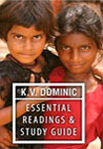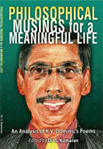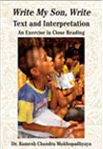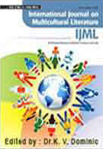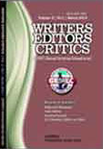Books Review in Detail
Review Of Patricia Prime’s Review of K. V. Dominic’s Winged Reason
Patricia Prime’s Review of Winged Reason
Winged Reason, K. V. Dominic. New Delhi: Authorspress, 2010.
Rs. 95, 77 pp. Paper back. ISBN 978-81-7273-530-2Â
Â
Patricia Prime
(Appeared in WEC 1.1 (March 2011)
Â
Dr. K. V. Dominic’s first collection of poetry, Winged Reason, contains 39 poems whose themes are those of social issues surrounding poverty, human cruelty, old age, the handicapped, unemployment, female foeticide and many others.
Dominic is an educated writer, a lover of literature, an academic. His work springs from his admiration for the Romantic poets of English verse and from the American poets Frost and Dickinson. He is an English teacher, an editor and a reader, a lover of the lyric line. And thus it is that certain words can be applied to his way of writing: modest, precise, wry and contemporary.
Winged Reason invites its readers in with the opening poem “In Memoriam: George Joson,†an elegy written for a colleague:
How unbearable the grief and pain
For your beloved family and friends
The most painful was the sight
When your youngest kid,
Not knowing what has happened,
kissed your face
again and again
and plucked flowers
from your wreath . . .
Then there’s the beautiful elegy written for E. K. Nayanar, the Communist Chief Minister of Kerala:
A vast surging
sea of humanity
followed wailing and weeping
you on your last journey.
No rain could stop them;
no sleep could retreat them.
Thus mourning with the Nature,
your people swarmed round your body,
bidding “Lal Salaam, Lal Salaam.â€
“A Nightmare†accomplishes a kind of metamorphosis as the poet soars like a hawk overhead, witnessing the distress, poverty, punishment, sickness and slums of the city below. As the siren sounds, the poet awakens from his nightmare:
Tears streaming down my cheeks,
I could see nothing more;
nor did I wish for it;
The siren sounded as usual
to disturb my nightmare!
The contrast between the “hawk hovering in the sky†and the leper begging at the door, evokes a world of nightmare and anguish.
“Beauty†is an example f the poet at his most playful. It’s a vignette of a girl looking at herself in a mirror wondering “why didn’t God create me a little more beautiful?â€Â The poem tells us to think of people we most admire and to discover that “Bodily beauty is all subjective and relative†and that it is inner beauty which is most to be admired.
In experimental spirit, Dominic writes “Lal Salaam to Labour,†a poem that celebrates the working population. The poem is divided into triplets:
They sow the seed;
reap the corn;
and we eat and sleep,
They spin and weave;
make beautiful clothes;
and we wear and ‘shine.’
In “My Teenage Hobby,†the poet reveals at least one aspect of himself as a youth:
Once when I pulled a fish,
flashed a horrible vision;
I am pulled from the sky;
death struggle on the line.
Awestruck and repentant,
I unhooked the fish
and dropped in the water.
No more did I angle;
Reflections on life
became my pastime.
This fear is startling, a reminder that emotion is at the forefront of Dominic’s work. Sometimes that’s all to the good, of course. That which is stated so obviously can be powerful, and this poet is often preoccupied with adversity. In the poem, “Old Age,†for example, the poet says, “Human life is a cycle: / born to the earth / with a shrieking cry; / life’s first breath.â€Â Dominic can’t resist ending the poem with these words, “Ageism is contemptible; / unpardonable too. / Today’s torturer / tomorrow’s victim; / we live with ironies.â€
In “Sleepless Nights,†a nature piece which has much to recommend it, Dominic chooses short stanzas as his method of composition. Perhaps the justification for this is that the broken verses “unfold†the scene:
The cuckoo’s flute
woke me up at every dawn;
but lately having little sleep,
I lie restless for hours and hours,
longing vainly to wake him up.
In the melancholy, but effective and memorable poem, “Ammini’s Lament,†about the distress of the poet’s cat as she searches for her kittens, there’s the superb image–“Ammini’s heart-breaking wails, / her unnatural reverberating cry, / piercing through my heart, / and then to my wife.â€Â Then, in the poem, “Ammini’s Demise,†the cat dies, and we have the lovely image of her “snow-white figure, / her emerald eyes, / black bushy tail, / her gentle demeanour, / her sleep on my lap.â€Â I love the words based on Keats: “A thing of beauty / is a joy forever; / and its loss / sorrow forever.â€
“City Versus Village,†although a poem about death, has its amusing side, as we see in the phrase: “The mournful song / came from a rented house. / Though a hundred metres away / we never went there, / nor they visited our house.â€Â Even though neighbours live close by, we guard our own privacy until something unexpected happens.
“Kaumadi Teacher is No More,†is another elegy dedicated to the memory of a woman who gave her life to the service of others:
Kaumadi pledged to wear no ornament;
she led a humble life;
taught Hindi in Malabar schools;
closely followed in Gandhi’s footsteps;
taught national language
till her death at ninety-two.
This is a poem of praise for wonderful role model, phrased in a delicate, unforced and distinctive style.
The final poem, “Michael Jackson, King of Kings,†remembers the joy the singer and performer brought to people the world over:
Angels sing and dance
to your lightning steps.
You were the king of kings,
both of music and dance.
This is a simple poem, but written with passion and feeling to celebrate the passing of a wonderful performer.
At his best then, Dominic blends the complex tradition of English verse into something wholly his own, and the poems do so in a variety of forms and via different arguments, all of which amount to Dominic’s interest in social themes.
–Dr. Patricia Prime (Renowned English Critic, Poet) Auckand, New Zealand.

